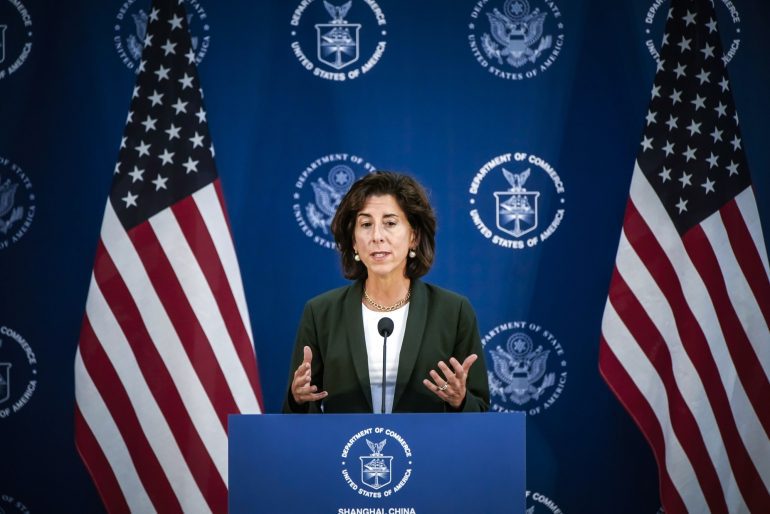- Biden administration considering additional restrictions on China’s access to advanced chip technology for AI.
- Discussions focus on limiting China’s use of gate-all-around (GAA) chip architecture.
- Aim is to hinder China’s ability to develop sophisticated AI computing systems and safeguard nascent technologies.
- Key industry players gearing up for mass production of GAA-designed semiconductors.
- Market reaction seen with declines in shares of Nvidia, AMD, and Intel post-reports of potential restrictions.
- US has already imposed restrictions on advanced semiconductor exports to China.
- Regulatory process ongoing, with revisions to initial drafts prompted by industry feedback.
- Potential regulations may not entirely ban GAA chip exports but could target underlying technology.
- Discussions also underway regarding potential limitations on exports of high-bandwidth memory chips.
- Some US allies also pursuing export control measures related to GAA technology.
Main AI News:
The latest deliberations within the Biden administration underscore a growing effort to tighten the reins on China’s access to critical chip technology integral to artificial intelligence (AI) advancements. Sources familiar with the matter reveal that discussions are underway regarding potential further restrictions, specifically targeting cutting-edge hardware poised to revolutionize the market.
This move, according to insiders who requested anonymity due to the sensitive nature of the talks, could entail limitations on China’s utilization of the gate-all-around (GAA) chip architecture. GAA technology holds the promise of enhancing semiconductor capabilities, with chipmakers currently in the process of integrating it into their offerings.
The timing of any official decision remains uncertain, with officials still in the process of gauging the potential scope of such regulations. The overarching aim for the United States is to impede China’s efforts to construct sophisticated computing infrastructures necessary for AI development, while also safeguarding nascent technologies from premature commercialization.
Key players in the semiconductor industry, including Nvidia Corp., Intel Corp., and Advanced Micro Devices Inc., alongside manufacturing giants like Taiwan Semiconductor Manufacturing Co. and Samsung Electronics Co., are poised to commence mass production of GAA-designed semiconductors within the next year.
Market reaction to these considerations has been notable, with shares of Nvidia witnessing a decline of up to 2.5% to $118.74 in New York trading following reports of the potential restrictions. Similarly, AMD saw a 1.9% drop, while Intel experienced a modest decline of less than 1%.
The United States has previously imposed several restrictions on the export of advanced semiconductors and chipmaking tools to China. Commerce Secretary Gina Raimondo has reiterated the commitment to bolstering such measures as necessary to prevent Beijing from gaining access to cutting-edge AI technology, citing national security concerns.
However, the Biden administration faces the challenge of navigating these regulatory initiatives amidst the countdown to the November presidential election, necessitating careful prioritization of technologies and regulations.
Notably, the Bureau of Industry and Security (BIS), responsible for overseeing export controls, has forwarded a draft rule pertaining to GAA technology to a technical advisory committee. Comprising industry experts, this panel provides insights on specific technical aspects, marking a crucial step in the regulatory process.
Yet, industry feedback has prompted revisions to the initial draft, with concerns raised regarding its perceived broad scope. Uncertainty lingers over whether the proposed ban would solely restrict China’s development of GAA chips or extend to impeding overseas companies, particularly American chipmakers, from supplying their products to Chinese electronics manufacturers.
Insiders familiar with the matter suggest that while the measures may not culminate in a complete ban on GAA chip exports, they are likely to focus on regulating the underlying technology necessary for their production.
In addition to GAA technology, there are preliminary discussions surrounding the potential limitation of exports for high-bandwidth memory chips. These chips, manufactured by SK Hynix Inc., Micron Technology Inc., and others, play a vital role in accelerating memory access, thereby enhancing AI accelerators’ performance.
While the prospects of regulations on high-bandwidth memory chips remain uncertain, sources emphasize that discussions regarding GAA technology are progressing further. Moreover, some US allies are independently pursuing their own export control measures related to GAA technology, reflecting a broader international effort to safeguard critical technologies.
Conclusion:
The Biden administration’s contemplation of further restrictions on China’s access to AI chip technology signals a tightening regulatory environment in the semiconductor industry. This move aims to protect American technological dominance and national security interests, potentially reshaping the dynamics of global semiconductor trade. Industry players will need to closely monitor developments and adapt to potential shifts in supply chains and market dynamics.

